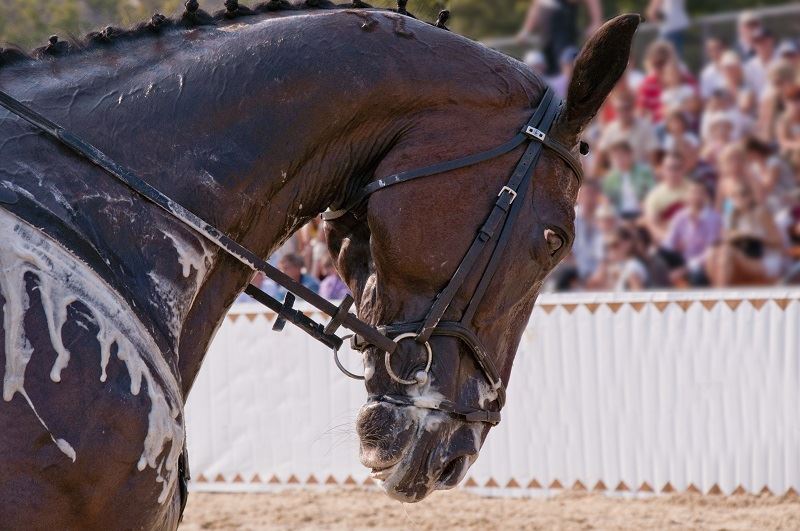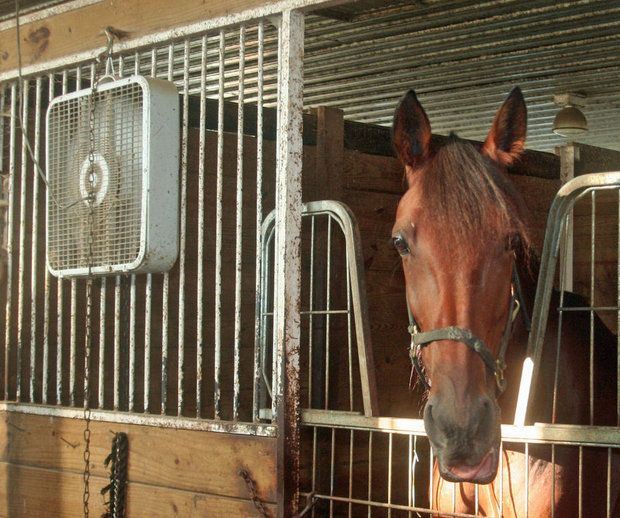The heat is coming on something fierce in Kentucky, and though summer is a great time to ride, horse owners must take care that they are not asking too much of their steeds in weather that is too hot and humid for them to effectively cool themselves. Summer heat can be dangerous for horses, resulting in dehydration, lethargy, and general malaise. Severe heat stress may cause diarrhea, or even colic. Following these 10 tips and using common sense will help keep you and your horse safe and comfortable during the hot days ahead.

Dr. Janet Johnston, an Emergency and Critical Care veterinarian at Penn Vet's New Bolton Center, offers the following tips as we approach the first days of summer:
1. Choose cooler turnout times. If your horse has a stall, but is turned out for part of the day, provide turnout during the cooler hours. Overnight is ideal, but if that's not possible, then have the horse go outside as early as possible during the day.
2. Provide shade. If your horse lives outdoors, or if it must be outside during the day, provide relief from the sun. A run-in shed is best. Trees are a source of shade, but as the sun moves, so will the shade.
3. Move the air. Fans are a great way to help keep the air moving in the barn, but use them wisely. Your horse will benefit most if the fan is pulling the hot air out of the stall, not pushing air into the stall.
4. Mist your horse. If you are fortunate enough to have a system to mist your horse, use it. As the moisture is absorbed from your horse's skin, it will take away some of the heat. Frequent mistings are far more effective than a single dousing with a hose.
5. Provide fresh, cool water and an electrolyte source. Make sure your horse has plenty of fresh, cool water. A bucket hanging on a fence will get warm, and the water will no longer be appealing. Left long enough, the water will also become stagnant and unhealthy. If you are providing clean, cool water and your horse doesn't seem to be drinking, then encourage it by providing a salt block, or even by misting hay with salt water.
6. Slow down the work. Don't think that because your horse has been working intensely at 1:00 pm every day that it can take the heat when the temperature tops 90 degrees. If you have to work your horse in the heat, lighten the work or spread it out over a couple of short sessions. This is especially important when the humidity is high, contributing to the poor quality of the air your horse is breathing.
7. Stick to a schedule. Within the parameters of keeping your horse cool, try to stay as close as possible to a normal schedule. Too much change at one time can be an invitation to colic.
8. Avoid sunburn. Horses, especially white horses, can suffer from sunburn. Even those with white socks and blazes, pink noses, or hairless patches from scarring can be susceptible. Using a fly scrim can help. In addition, applying sunblock such as zinc oxide, to small, particularly vulnerable areas can be effective.
9. Clip horses with longer hair coats. Clipping is important, especially for horses with Cushings disease. While some coat can provide protection from the sun and insulation, a long, thick coat tends to hold heat and makes it difficult for the horse to cool down.
10. Know your horse and signs of heat stroke. Heat stroke can happen anytime your horse is exposed to excessive heat that his body cannot handle.
You should know your horse's normal temperature, heart and respiratory rates. To find the heart rate of a horse, simply find a pulse and count the beats for 15 seconds, then multiply that number by 4. Count the breaths per minute in a similar way.

Signs of heat stroke can include:
- An elevated heart rate that does not return to normal in a reasonable period of time
- Excessive sweating OR lack of sweating
- Temperature that persists above 103 degrees F
- Depression, lethargy
- Signs of dehydration: dry mucous membranes, poor capillary refill and poor skin turgor
If you are concerned that your horse is suffering from heat stroke, call your veterinarian immediately and get your horse into a cooler environment.
Read more here.
